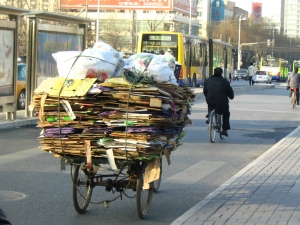China’s Hidden Environmental Lessons
China’s environmental troubles are often decried in the Western press, and generally there is a good basis for the articles’ conclusions (See the NYT ‘s “Choking on Growth” series). Still, China and its people also have a lot to teach foreigners about prudent energy conservation and consumption.
Although China may not have the best energy efficiency utilization (see EIA numbers), the country’s prior poverty inspired its populace to adopt some surprisingly environmentally-friendly policies.
Person-Driven Policies
The Chinese consumer, to conserve cash, often makes due without unnecessary perks that are common for Westerners. Chinese consumers, by doing so, save thousands of dollars and millions of watts of electricity.
– Natural Drying Clothes (Live Naturally)
Many Chinese do not use electronic driers 烘干机. Instead, Chinese clothing dries in the wind and sun. This method of drying works great for clothing, not so well for bedding or woolen materials. Still, if one owns a spare bed-cover or wool jacket, then natural drying works perfectly. Most clothing dries within twenty-four hours.
Forgoing driers saves China millions of watts of electricity each year.
– Human-Powered Recycling (Capitalist Environmentalism)
Although the recent US economic recession greatly increased the number of lower-class entrepreneurs wandering city streets collecting recyclable trash, the Chinese long ago perfected the art of scavenging. In China’s cities, from Beijing to Chengdu, poor and retired people seek plastic and aluminum to recycle.
In every city, poor entrepreneurs dart hither and tither, snatching empty plastic bottles from hands and scavenging from trash cans. Although each plastic bottle only results in a few jiao of cash, China’s poor act as guardians of the environment- ensuring that not even a plastic bottle, crushed and covered by garbage, escapes recycling.

Entrepreneurial Recycling in Beijing / China Comment
Also of note, from 2003: http://www.china.org.cn/english/2003/Jul/69702.htm Amusing complaints that people are not sorting their trash. Perhaps the people decided trash-sorting was unnecessary because they knew the city’s unofficial garbage collectors would likely scavenge the trash before the municipality’s collectors arrived.
– Air Conditioning Only When Necessary (Waste Not, Want Not)
Chinese restaurants save millions of yuan each year by only turning on air conditioning units when customers actually utilize portions of the restaurant. Many Chinese restaurants have both a common dining room and a selection of private dining “party rooms.” Each party room often has a space heater or air conditioner that is only turned on when the room is occupied.
– Heating When Necessary (Think Global, Act Local!)
Chinese often huddle slightly cold in some restaurants and most universities, wearing jackets and scarves tucked in tight. Although restaurants and universities have the ability to heat their common rooms, the proprietors and deans choose to keep thermostats turned down. These proprietors understand that by refraining from over-heating buildings they can keep down costs.
In contrast, American universities spend millions on heating and cooling each year. All their spending results in higher carbon output and higher student tuition costs to pay for heating and maintenance overhead. American universities and campus environmentalist activists can learn much from Chinese students’ stoic endurance of slightly uncomfortable weather.
– Hotel Lights (Use Only When You Need)
Chinese hotels slash unnecessary electricity bills by only allowing patrons heating, air conditioning and light in their rooms if the patrons are actually present in the room. Rooms’ lights only turn on if a room key is placed in a wall socket unit. American budget hotels could save thousands of dollars by implementing similar conservation-inducing practices.
– Hot Water, Not Bottled (Reuse!)
Although bottled water sells well in China (at 0.8 RMB it’s a great bargain), Chinese are just as often likely to be seen toting hot water in plastic containers. Although the process of warming water to a boiling point consumes electricity, the use of reusable plastic containers cuts down on disposable water bottle waste.
– Solar Water Heaters (Self-Sustainability)
“China has a cumulative installed capacity of solar water heaters (SWHs) that surpasses 90 million square meters (m2) of collector area—roughly 60 percent of the world’s total. In fact, nearly one in ten Chinese households owns an SWH.” (from http://www.ita.doc.gov/media/Publications/pdf/china-clean-energy2008.pdf pg 11)
=====================
Government Driven Policies
– Plastic Bag Revolution (Pay For What You Consume)
China attempted to reduce plastic bag consumption in summer 2008. In July, a ban was imposed on ultra-thin bags. Thicker bags could be sold, but major cities’ supermarkets and department stores were supposed to charge 0.3 to 0.5 yuan per bag (Xinhua, July 2, 2008).
Bans on free plastic bags are popular in some places in Europe and a few American cities, but have yet to permeate America wholesale.
http://news.xinhuanet.com/english/2008-06/06/content_8320694.htm
http://news.xinhuanet.com/english/2008-06/18/content_8390250.htm
China’ Comment’s July 4, 2008 article on Plastic Bag Entrepreneurs
====
Later, China Comment hopes to post other environmentally-friendly measures practiced in China. If you know of any other energy-saving lessons that China can teach America and the “West”, China Comment would be glad to hear them.
